The Magazine of Fantasy and Science Fiction, November 1979: A Retro-Review
I didn’t really pick the Magazine of Fantasy & Science Fiction to begin my November 1979 survey of sf/f magazines, it just happened to be on top of the stack. Overall I have to say that I was disappointed.
Lord Valentine’s Castle, Part 1, by Robert Silverberg. Given how much I enjoyed Downward to Earth in the November 1969 Galaxy, I was eager to see how Mr. Silverberg had evolved over a decade. … Lord Valentine’s Castle was a big letdown. You often hear that editors and agents really hate stories that start with a guy waking up not remembering anything, and I can totally see why. Valentine, the main character (MC), walks toward the great city of Pidruid, he meets a herdsman, they join a juggling troupe, Valentine starts to realize he has no real memories before walking to Pidruid, they practice for the grand parade for the King-of-the-World (the Coronal), also named Valentine, he has odd dreams. This goes on for 93 pages (easily 60% of the magazine), of which I only read about 80, and which only started cooking about page 75.
[Click the images for fantasy-sized versions.]
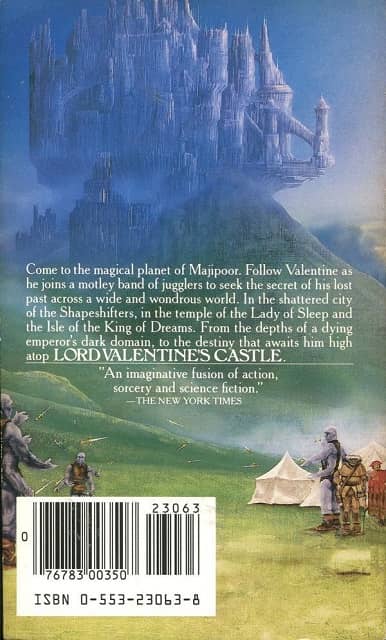 |
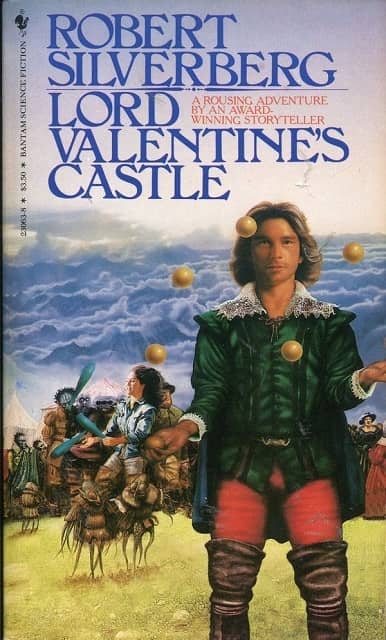 |
Cover by Jim Burns
My main gripe was that it was so slow, and broke so many standard writing rules-of- thumb, and not in a good way. It was somewhat refreshing, at the start, that there was no ambush or attack or something but… nothing really happens. The power structure of the world, the interplay between the Coronal, the Pontifex, the Lady of the Isle of Sleep, and the King of Dreams was sloooowly introduced, and the juggling… so much juggling… the way-late not-surprising reveal that Valentine and Lord Valentine might have something to do with each other did nothing for me.
The story did inspire the Ron Walotsky cover of the issue.
Column — Books, by Joanna Russ. Earlier in 1979 Ms. Russ wrote a column quite critical of the state of current fantasy. This column is her response to nine months of hate mail.
5. I knew it. You’re a snob.
Science fiction is a small country which for years has maintained a protective standards-tariff to encourage native manufactures. Many readers are in fact, unacquainted with the general canon of English literature or the standards of criticisms outside our own small field. Add to this the defensiveness so many people feel about high culture and you get the wholesale inflation of reputations that James Blish lambasts in The Issue at Hand. Like him, I believe that somebody has to stop handing out starts and kisses […]
I was unsure if J. Russ was answering these points in a bit of satirical affectation (because she comes across as exactly the kind of high culture snob she’s accused of being, constantly reminding the reader that she is very smart and very well read) or if it is just the way she actually is.
“Special Effects” by Mel Gilden. A famous movie director brings home a prop space-ship from the set of his latest film. He and his wife set it up in the garage.
“Here they come,” his wife said.
Creatures crept out from behind stuff piled along the floorboards. They looked like little people made by children from toothpicks and balls of clay. Serious faces, made charming by their small size, stared first at the humans leaning against the counter, then at the preposterous thing in the middle of the floor.
The aliens had crashed, years before, basically in the director’s backyard. He and his wife have been harboring them, providing them with equipment to repair their damaged gear. The beings leave that night, the movie is a great success, the aliens buzz the premier, everyone is amazed.
This is, I suspect, a tip of the hat to Close Encounters of the Third Kind. Even at short length, Gilden’s use of “the director” and “the director’s wife” and “the movie” grates over it all.
“Exodus” by Stephen L. Suffet. Transarmco’s R&D has finally developed an IPAT (Individually Programmed Anti-Personnel Targeting). But it needs a field test, which is no easy matter, so they conduct their test across the time barrier. As can be guessed, they are helping the Israelites escape from Egypt, and it really sticks it to the MC’s Egyptian boss. Wah Wha Whaaa.
Column — Films by Baird Searles. For reasons that escape me, Searles chooses to take on the persona of Old Movie Buff (OMB) to review “The Muppet Movie.” A sample is provided:
This Kermit meets a bear who tags along with him and tells bad jokes, in fact the two of them reminded me of Hope and Crosby in the Road pictures, because they kept making jokes about being in the movie you were seeing, and then they meet a lady who looks like a pig (Dietrich and Davis and Colbert were individual looking but they didn’t look like pigs) and she was no lady either.
I wasn’t sure what the point of Old Movie Buff affectation was, winking at the audience Fozzie-Bear-like and highlighting how cool it was by not being cool enough to get it?
Oh no my friends, behold his final take:
I’m afraid I agree with OMB, but for different reasons. What is wonderfully charming on a fast half-hour TV variety show doesn’t seem to be able to sustain a plotted hour-and-a-half of film. And those songs…
Swing and a miss!
Movin’ right along…
“Demystification of Circumstance” by Barry Malzberg. Haskins, a scout for an Earth invasion fleet, has crashed into the soon-to-be-warzone, and is trapped and interrogated by the natives — who happen to be intelligent rocks. Particularly annoying intelligent rocks.
“I’d never under any kind of hypnosis betray the whereabouts of the fleet or the time of the attack. My conditioning forbids it.”
The rock seemed to shrug, a difficult gesture without hands or shoulders, accomplished through shadow play, perhaps. “That may well be, “it said. “All of this may be hallucinatory, conjured to impress you; but if we have the power to so hallucinate, we certainly have the power to extract secret material form your mind, wouldn’t you think? You’d better face the reality of the matter […]”
Wow. This was bad. Was it a hallucination brought on by the horror and futility of war? The ending doesn’t illuminate — and not in a good way. Not in a way that leaves you pondering the big questions, but in a way that makes you glad to leave this one behind.

“Well-Wisher” by Bob Shaw. Ibn Zuhain, Lord of the Long Valley, finds a genie in a bottle by his fountain. Zuhain has his doubts, and his first wish is to have his wounded hand restored. That done, he considers what to do with the remaining two. His youth, perhaps?
History was one of the passions of which he was still capable, and he devoted himself to it, not for what it taught him about the past, but for what it enabled him to teach himself about the future. He saw the world as being in a state of continuous change, and it was one of his principal regrets that life was too short to allow more than a glimpse of the mighty spectacle of the Sons o the Prophet triumphantly carrying the true faith to the ends of the earth. But now, suddenly, it was within his power to soar like an eagle above the hidden landscapes of times to come.
He wishes to see the world 1,000 years in the future, to see the true faith spread across the earth. But when he looks, all of Arabia is a scene of poverty and degradation. And around, across and over it, sleek well-fed arrogant infidels journey in horseless carriages.
Ibn Zuhain asks to know what powers such conveyances and learns that it is a strange blue crystal, not common in Arabia, whose energy has been harnessed by the barbarians in faraway lands.
Zuhain’s third wish is to rid the world of those blue crystals and give him an equally powerful talisman in its place. It’s a wish so audacious that it takes the genie aback, but he grants it.
The clear water of the fountain — solace of his fading years — had dried up, and in its place there gouted fort a black and evil-smelling oi which, already, had begun to disfigure everything in its vicinity.
This was a very good story, hinging on the Shaw’s ability to paint Ibn Zuhain as a full character from the start of the story to the end. The genie is interesting, but Zuhain makes the story. Also, as I’ve said before, deals-with-the-devil and genie stories tend to only have so many ways they can end, and although it wasn’t a complete surprise, the looking into the future which is our alternate history idea was very clever.
Bob Shaw actually won a Hugo Award for Best Fan Writer in 1979, so “Well-Wisher” wasn’t just a flash in the pan.
Column — Science, “The Sun Shines Bright,” by Isaac Asimov. Asimov takes us into the heart of the sun. Fusion! Antiprotons! He wanders around the subatomic realm for a few pages before finally settling on neutrinos and their detection. A theoretical particle without mass or charge, how do you detect it? He outlines a couple of different proposals by a couple of different researchers.
One of the researchers, Dr. Raymond Davis, had already run an experiment that had detected neutrinos — although not as many as there should have been. Asimov explores other experiments being proposed to differing types of neutrinos. Asimov is a fine science writer, but would it have killed F&SF to put in some illustrations to keep the subatomic particles straight?
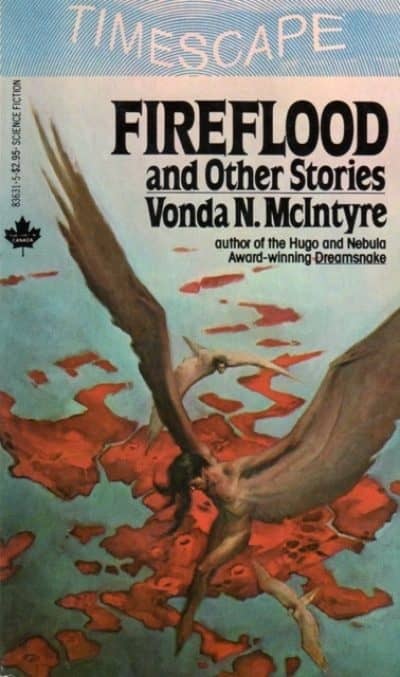 |
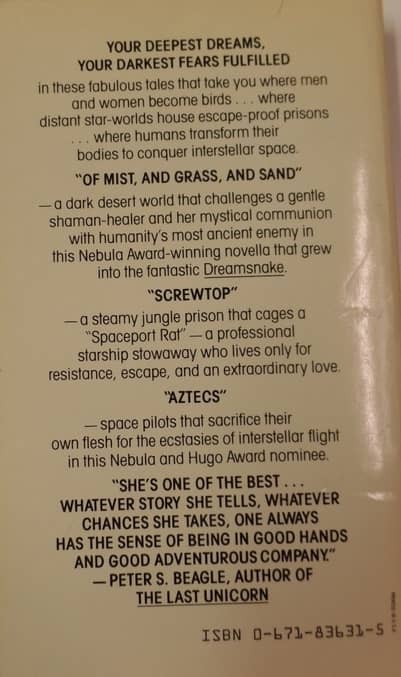 |
“Fireflood” by Vonda McIntyre. In an unnamed future, some people have volunteered to be modified to explore and colonize distant planets. The issue is that that part of the project — the modification part — happens and then the actual colonization part doesn’t; it gets cancelled. That’s the background to this story, add to that the modified humans are now in a kind of reservation. Dark, the MC (yes, she’s named Dark, for some reason) is a member of a kind of tunneling armadillo-like race, and they are making a break from their unhappy circumstances, trying to get to the ‘flyers’, the other modified humans in another reservation. Dark can stay underwater for hours, tunnel down to bedrock, and survive close proximity to lava. A team of regular humans pursue her and she plays a cat and mouse game with them until she does get to the flyer reservation. The flyers don’t really want much to do with her or her kind or whatever scheme they have. The most they are willing to do is, maybe, let her stay on their side of the island, but they aren’t even sure about that. In the end, they don’t, it’s just not a problem they want to have, so they send her back, and back she goes.
A lot of this story hinged on the definitions of beauty and ugliness. Turns out the diggers don’t look too pretty, with the claws and the armor, and none of them looked too pretty in their human lives, either. The flyers, on the other hand, are gorgeous — but it turns out they were also remarkably plain people pre-modification. This seemed to go on for a bit too long, but a crucial plot point hinges on it. Some of the bird-like flyer were not actually going to stay bird-like. The bird-phase was just a step toward the final flying bug/lizard phase — which would be ugly. So the flyers would rather stay on earth and be alienated and beautiful as opposed to aligning with the diggers and causing trouble or worse (to the flyers, at least) getting the colonization project going again.
Overall, the November 1979 F&SF was a real disappointment. One big story that didn’t move, a book review column that didn’t review books, some smaller stories that were lackluster, a movie review that embarrassed itself — all that is on the one hand, Asimov’s science column, the excellent “Well Wisher,” and the good story “Fireflood” on the other. But those three were just not enough to lift the issue, in my opinion.
I will say that reading this magazine was a bit of a stroll down memory lane for me. In my look — back at 1979, I totally forgot about Close Encounters of the Third Kind, and the OPEC embargo, and The Muppet Movie.
Previous entries the Quatro-Decadal Reviews include:
Amazing Stories, November 1969
Galaxy Science Fiction, November 1969
The Magazine of Fantasy & Science Fiction, November 1969
Worlds of If, November 1969
Analog Science Fiction/Science Fact, November 1969
Venture Science Fiction, November 1969
1969 Wrap-up
1979, A Look Back
Adrian Simmons is an editor for Heroic Fantasy Quarterly, support them on Patreon!
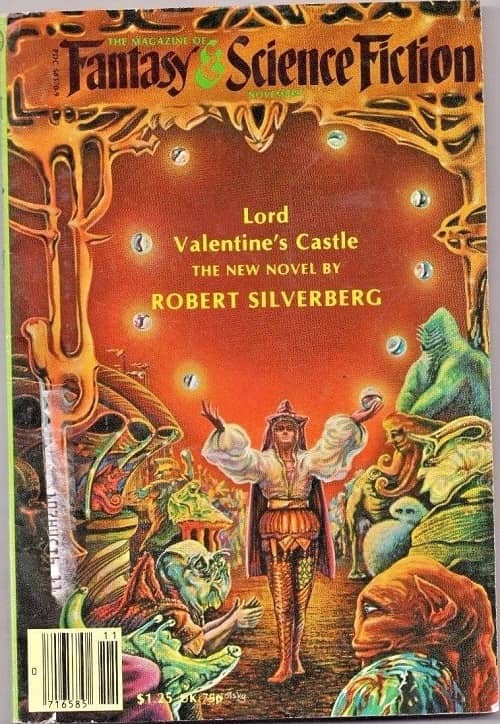
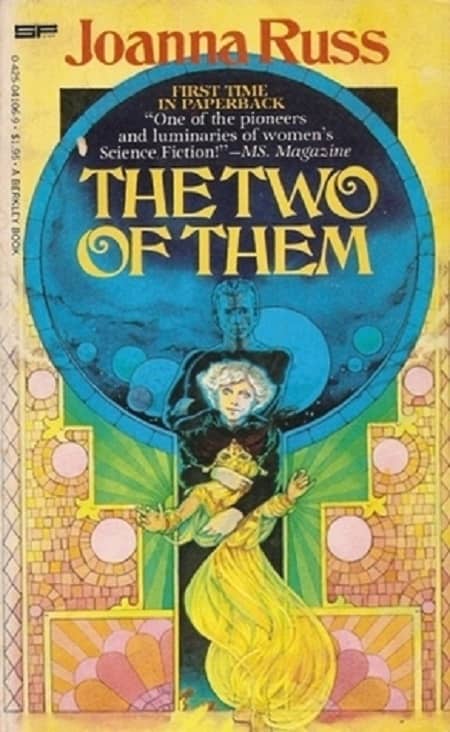
Thank you! I appreciate these full-issue reviews.
I have to say I do like Lord Valentine’s Castle, but that’s based on reading the entire novel — I might’ve had a different reaction if I was just given that opening section as a standalone piece.
And wow, Baird Searles was SO WRONG about the Muppet Movie …
M. Wootton- glad you like them. I like delving into them.
Joe H- yeah, LVC gets better as it goes along, but it took a while. In the end, I just wasn’t going to get invested in it. And Searles was so, so wrong!
I bought the paperback of LORD VALENTINE’S CASTLE and started reading with great hopes, soon dashed as I proceeded. I finished it, and vowed never to read any more Silverberg, which pretty much I have not done.
I too like Lord Valentine’s Castle. I enjoy a story that isn’t in a hurry, as long the company on the journey is congenial and the destination seems worth the time it takes to get there. There is a fine line between relaxed and slack, though, and I can understand someone feeling that LVC had crossed it. Certainly it’s much less focused than Downward to the Earth, which is Silverberg’s best book, in my opinion.
And geez, R.K. – I know life is short, but ONE strike and you’re out? Give Downward to the Earth or The Masks of Time or Hawksbill Station a try. They’re short, and you’ll find a different Silverberg than you found in LVC (which, to be fair, was more about building an exotic world than it was about the plot or characters).
Yea, NOT reading Silverberg is truly a mistake. On another note, that Fantasy and SF cover is a huge mistake. They expected to sell magazines with that? It probably was Siilverberg’s name that moved any issues 😉
Thomas Parker- like I said, it was refreshing that the story didn’t start with an ambush or something, but it just didn’t do much of anything over the length of it.
R.K.R., Thomas Parker and Barsoomia are right, it would be a shame to give up on Silverberg after one strike. I liked “Downward to Earth” so much in the 11/69 Galaxy that I bought the following three issues to finish it.
Barsoomia, you are also right that the cover art is really pretty off-putting.
It would have been very interesting if you had happened to start your survey with the previous issue of F&SF. The October 1979 issue was their thirtieth anniversary issue and was comprised entirely of reprints from its run.